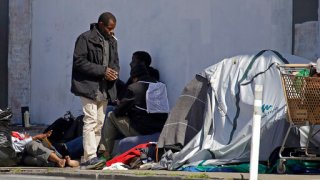
With California’s death toll from the coronavirus topping 1,000, lawmakers are looking at ways to slow the spread, especially in vulnerable populations such as the homeless.
The pandemic that has plunged California — the world’s fifth-largest economy — into recession has hit hard. There are concerns the virus could sweep through the state’s 150,000 homeless, who are challenging to test and are vulnerable because many have chronic health conditions and lack safe places to quarantine themselves, health officials say.
Gov. Gavin Newsom, who has announced efforts to move thousands of transients into government-funded hotel rooms, was expected to focus on homelessness during a Saturday news briefing.
On Friday, Los Angeles Mayor Eric Garcetti announced that next week the city will begin sending medical teams to the streets to screen people for the virus. In the next few weeks, teams will also begin offering fast-result COVID-19 field tests and those who are infected will be offered transportation to shelters and hotel rooms set aside for them to be quarantined, Garcetti said.
“If we encounter somebody who’s living on the street or in their car, somebody who’s in a shelter who’s sick, they’ll be able to test them right away,” Garcetti said.
So far, San Francisco is the only city to report a large breakout at a homeless shelter, where more than 100 people tested positive, including 10 staff. None were seriously ill when tested but three are in the hospital, said Rachael Kagan, a public health spokeswoman.
More than 30 homeless people have tested positive for COVID-19 in Los Angeles County, including six at a skid row shelter, but most cases involved people living on the street, health authorities said.
U.S. & World
California, meanwhile, hit a grim milestone on Friday when the number of COVID-19 deaths surpassed 1,000, according to a tally by John Hopkins University. The death toll came after California recorded its greatest number of deaths in one day, 95, on Thursday, eclipsing the previous mark of 71.
The state also reported for the first time that 3,500 cases are in nursing homes or adult care facilities, where the most vulnerable people reside and infections have spread quickly. That figure reflects about 12% of more than 29,000 cases reported.
There have been signs the outbreak is slowing in the month or more since most of the state’s 40 million residents found themselves under state and local orders to stay at home. Social distancing rules are being praised for that but they have hit the economy hard, shutting down schools, tourist spots and most restaurants and retail businesses.
Newsom named a task force Friday to help the state recover economically after he begins easing restrictions, although such a move isn’t expected for several weeks at a minimum. The nonpartisan panel of billionaires and corporate leaders that includes all four living former governors — two Democrats, like Newsom, and two Republicans — came after dismal unemployment figures ended a record 10-year economic growth streak.
The state lost 100,000 jobs in March as virus concerns took hold. The job losses were based on a survey taken the week that included March 12. That was one day after the NBA suspended its season and Newsom banned gatherings of more than 250 people, prompting the closure of Disneyland and other California icons.
Most of the state’s job losses occurred after that date, accelerating once Newsom issued a mandatory stay-at-home order on March 19. On Friday, Newsom announced 3.1 million people have filed for unemployment benefits since mid-March.
“We are now in a pandemic-induced recession here in the state of California,” Newsom said. “These are sober and challenging times.”
In order to begin lifting restrictions, the state will need to test 25,000 people a day and track down those they may have infected, a big task in the nation’s most populous state. Testing has been problematic for weeks in California — and across the U.S. — and fewer than 20,000 are administered each day, though testing sites continue to expand. Several areas have begun offering COVID-19 tests to people without symptoms.
“We’re testing people already when they’re sick, but we need to understand how COVID-19 is affecting people who may generally feel well, including kids,” Dr. Cameron Kaiser, Riverside County’s public health officer, said in a statement. “That’s going to be a key indicator for understanding how it spreads and knowing where our areas of concern are when we think about if and how much to open things again.”
A Stanford University study released Friday found that the virus may have infected a far greater number of people than presumed. Scientists tested more than 3,000 people for the presence of antibodies to the virus and estimate that 48,000 to 81,000 people were infected in Santa Clara County by early April, far greater than the nearly 2,000 people who have tested positive to date. The study is preliminary and hasn't been peer-reviewed.
Meanwhile San Francisco, Contra Costa and Marin counties joined others in the state that require people to wear masks or other face coverings to be worn in certain public settings to prevent spread of the virus.
San Francisco Mayor London Breed said the order would take effect Saturday but police will not enforce it until Wednesday.
More large events were also scratched as a result of the virus outbreak.
San Diego’s Comic-Con was canceled, though organizers said they plan for the festival to return in July 2021.
Taylor Swift canceled all performances for the year, including one in July that would have served as the opening of Los Angeles’ SoFi Stadium, the new home of the San Diego Chargers. She would have become the first woman to open an NFL stadium, organizers said.
___
Associated Press writers Amy Taxin in Orange County, Adam Beam and Kathleen Ronayne in Sacramento and Brian Melley and John Antczak in Los Angeles contributed to this story.



